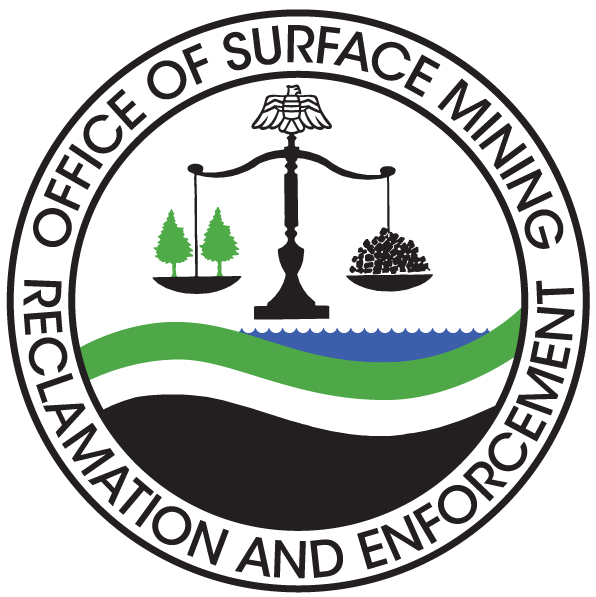Oversight of Active Surface Coal Mining
State and Tribal Oversight
SMCRA created a limited initial regulatory program directly administered and enforced by OSMRE. However, Congress intended that this program be only a temporary measure until States adopted regulatory programs consistent with the Act. Section 101 of SMCRA specifies that the primary governmental responsibility for regulating surface mining and reclamation operations should rest with the States.
To achieve primary regulatory responsibility, often referred to as primacy, a State must develop and obtain Secretarial approval of a program that meets the requirements of the Act and that is no less effective than the federal regulations in achieving the requirements of the Act. The State also must demonstrate that it has the administrative, financial, and legal capabilities to carry out the provisions of the Act. Upon approval, the State becomes the primary regulatory authority for coal mining and coal exploration within its borders. Currently, 24 States have primacy.
The SMCRA Amendments Act of 2006 authorized Indian Tribes to apply for and obtain primacy for the regulation, in whole or in part, of surface coal mining and reclamation operations on reservation land under the jurisdiction of the Tribe. However, at present, no Tribe has achieved primacy.
OSMRE assumes an oversight role after a State or Tribe achieves primacy.
Frequently Asked Questions
OSMRE defines "oversight" as the "process of evaluating and assisting states [and tribes] in the administration, implementation, and maintenance of approved programs. In collaboration with each state/tribe, OSMRE develops a Performance Agreement/Evaluation Plan tailored to the unique conditions of each state/tribe program. Performance Agreements/Evaluation Plans between OSMRE and the states establish how oversight is conducted during each evaluation year.
Oversight is the process of evaluating and assisting States and Tribes in the administration, implementation, enforcement, and maintenance of their approved regulatory programs. That role includes both programmatic evaluations and inspections of individual mine sites. Two primary objectives of oversight of State and Tribal programs are to identify potential problems and their root cause and to assist States and Tribes in resolving any problems or other issues that are identified.
OSMRE Directive AML-22 establishes policies and procedures for evaluation of State and tribal abandoned mine land reclamation programs.
OSMRE Directive REG-8 establishes policies and procedures for oversight evaluations of State and Tribal regulatory programs. Each year, OSMRE develops a performance agreement and evaluation plan to guide oversight activities within the State or Tribe for that year. That process includes solicitation and consideration of public input. OSMRE collaborates with the State or Tribe to the extent possible in developing the evaluation plan. OSMRE field and regional offices maintain an evaluation file and prepare an annual evaluation report for each State and Tribe.
When OSMRE’s oversight activities identify an issue that could result in a failure by the State or Tribe to effectively implement, administer, enforce, or maintain any portion of its regulatory program, the OSMRE field or regional office will work with the State or Tribe to develop an action plan to resolve the problem before it escalates into a situation that could result in substitution of federal enforcement or withdrawal of program approval under 30 CFR 733.12.
Selected oversight documents are available for review on OSMRE's Reg-8 and AML-22 Oversight Documents Database (ODocs). This an electronic database has built-in search capability to locate documents, such as Annual Reports, Topic Specific Reports, State Inspectable Units List, etc.
You can access ODocs at http://odocs.osmre.gov/
To begin a search, you must select a State or Tribe and an evaluation year. Please refer to the ODocs website for a description of the types of documents and final work plans that may be available. You may also request a hard copy of the document from your state or tribal contact.
We encourage public participation in the oversight process.
If you are interested in participating in this process within a specific State or Tribe, please contact your representative from the specific OSMRE Regional or Field Office.
You can also contact the Title V Regulatory Program for each state or tribe directly.
-
March 1
Announce opening of a 30-day period for interested parties to comment on oversight and provide suggestions for potential oversight review topics, including the opportunity for discussions with the Field Office
-
March 1 - March 30
Opportunity for interested parties to comment on oversight and provide suggestions for potential oversight review topics
-
April 15
Draft Performance Agreement/Evaluation Plan developed and sent to the State or Tribe for their review and comments
-
April 30
As appropriate, incorporate State or Tribe comments into the draft Performance Agreement/Evaluation Plan
-
May 1
Announce the opportunity for interested parties to comment on the proposed Performance Agreement/Evaluation Plan, including the opportunity for discussions with the Field Office on proposed oversight plans
-
May 1 - May 15
Opportunity for interested parties to comment and request discussions with the Field Office
-
May 15
Close of comment period/last day for public discussions with the Field Office
-
May 15 - June 30
In conjunction with the State or Tribe, finalize Performance Agreements/Evaluation
-
July 14
Post final Performance Agreement/Evaluation Plans on OSMRE’s website
- Alabama
- Alaska
- Arkansas
- Crow Tribe
- Colorado
- Hopi Tribe
- Illinois
- Indiana
- Iowa
- Kansas
- Kentucky
- Louisiana
- Maryland
- Mississippi
- Missouri
- Montana
- Navajo Nation
- New Mexico
- North Dakota
- Ohio
- Oklahoma
- Pennsylvania
- Tennessee
- Texas
- Utah
- Virginia
- Washington
- West Virginia
OVERSIGHT GUIDANCE DOCUMENTS
The following documents provide more information on oversight.

